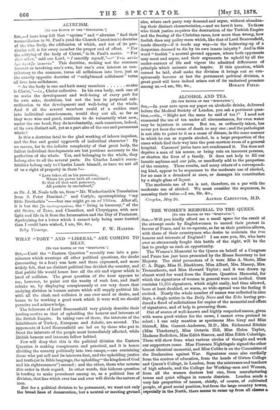ALTRUISM.
[TO TIER EDITOR OF TRH "SPEOTATOR:1
have long felt that " egoism " and " altruism " find their reconciliation in St. Paul's (and the Church Catechism's) doctrine of the One Body, the edification of which, and not of its par-
ticular self, is for every member the proper end of effort. " For
the edifying of the body of Christ," is St. Paul's motto. " For their sakes," said our Lord, "I sanctify myself,"—." 'Tvip can-Zy ;ye.) ci7dc‘a, ithawrem." This doctrine, seeking not the common interest as involving one's own, but one's own interest as con- tributory to the common, turns all selfishness into love, just as the exactly opposite doctrine of "enlightened selfishness" turns all love into selfishness.
" As the body is one and hath many members so also is Christ,"—i.e., Christ collective. In his own body, each one of us seeks the development and well-being of every part for its own sake, doubtless, but not the less in perpetual sub- ordination to the development and well-being of the whole. And if all the several members could of a sudden start into individual consciousness, would they not all, so far as they were wise and good, continue to do voluntarily what now, under the one head, they do involuntarily, each conscious, indeed, of its own distinct self, yet as a part also of the one and paramount whole ?
Is this a doctrine fatal to the glad working of inborn impulses, and the free and genial upgrowth of individual character? By no means, for in the infinite complexity of that great body, the fullest individual developments are but portions necessary to the perfection of the whole. Yes, and belonging to the whole, they belong also to all the several parts. Do Charles Lamb's eccen- tricities belong only to Charles Lamb himself, or have we not all of us a right of property in them ?-
" Lovo takes all as his possession, Where his power hath all combined ;
So that all that each possesses, All partake in unconfined,"
as Dr. J. Dd. Neale tells us, from " Mr. Wackerbarth's Translation from S. Peter Damiani ;" and Carlyle, apostrophising " my little Brotherkin "—but one might go on ad libitum. After all,
it is but the 6.44.0?■070t01.4441;, the " living in harmony," of the old Stoics, of Zeno, and Cleanthes, and Chrysippus, with new light and life in it from the Incarnation and the Day of Pentecost. Apologising for a letter which I cannot help being more hurried than I could have wished, I am, Sir, &c., Selby Vicarage. F. W. HARPER.


































 Previous page
Previous page